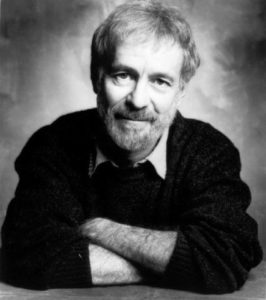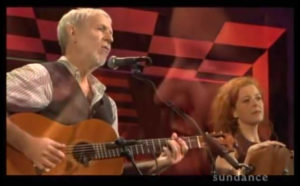Jesse Winchester
If you listen to many of the songs Jesse Winchester wrote in his four-decade career, tragically cut short by his death at 69 from cancer in April 2014, you’ll hear most of the elements of what’s become known as “Americana” – detailed, empathetic stories of everyday people (including himself) set to music incorporating folk, country, bluegrass, blues and gospel influences.
How ironic, then, that a musician with such a strong sense of personal and musical roots should make the life changing decision to leave his Memphis home in 1967 and resettle in Canada in defiance of his draft notice, a.k.a. an invitation to fight in Vietnam.
Born on the army base – another irony – in Bossier City, La., where his father was stationed, Jesse was mostly raised in Memphis, where the Winchester name was well-established in local politics and society. There were ten years of piano lessons ahead, playing guitar in high school bands, and attendance at Williams College in Massachusetts, where Jesse made the first dramatic change in his life. During a year of studies overseas, he joined a rock band in Munich, Germany, and toured there before and after his 1966 graduation.
But in the mid-Sixties, graduating from college almost inevitably led to military service, and Jesse soon received his draft notice back in Memphis. Aware of the consequences, he bought a one-way ticket to Montreal and fly north with his guitar and a few hundred dollars.
After a few years of playing piano in Canadian bars and teaching himself to write songs, Jesse met Robbie Robertson, lead guitarist and main writer for The Band, the legendary quintet of former Dylan backing musicians, “through a friend of a friend.” Robertson produced Jesse’s self-titled debut album, enlisting fellow Band-mate Levon Helm on drums and mandolin and whiz-kid musician Todd Rundgren as engineer. That first album was released with the most low-key packaging possible – no lyrics and a gatefold cover with the same photo of Jesse on all four panels, resembling a 19th Century “Wanted Dead or Alive” poster.
Fortunately, Jesse’s songs spoke for themselves. That first album included reputation-building original compositions like the homesick “Yankee Lady” (covered by Tim Hardin, Brewer & Shipley, and Matthews’ Southern Comfort”), “Biloxi” (Jimmy Buffett, Tom Rush, Ted Hawkins), “Brand New Tennessee Waltz” (The Everly Brothers, Patti Page, Ronnie Hawkins) and the rollicking “Payday” (Elvis Costello, Alex Taylor).
Although his inability to tour the US hampered his career until President Carter declared amnesty for draft defiers in 1977, Winchester remained based in Canada, writing and recording great songs that solidified his critical acclaim and popularity among other artists. Jesse’s “Rhumba Girl” was a pop hit for Nicolette Larson, “Well-a-Wiggy” reached the R&B charts in a version by the Weather Girls, and Michael Martin Murphey had a Top 10 country single with “I’m Gonna Miss You, Girl,” which Jesse finally recorded for his new Love Filling Station CD. Reba McIntyre and Wynonna Judd have been among the most regular outlets for his songs. Jesse even had his own Top 40 hit with “Say What” in 1981.
He received a Lifetime Achievement Award from the American Society of Composers, Authors and Publishers in 2007. This fall he will be posthumously inducted into the Memphis Music Hall of Fame.
After releasing seven albums between 1970 and 1981, Jesse took some time off to recharge, living on the royalties from his songs. He broke cover again with 1988’s Humour Me, which was followed by another long wait for 1999’s Gentleman of Leisure. In 2002, Jesse and his new wife finally relocated back to the States, in Virginia. While Winchester has maintained an active touring schedule during much of his career, his return to the recording studio to cut Love Filling Station after a nine-year absence was inspired by that most romantic of reasons: “My wife kept bugging me.”
The 2009 release of Love Filling Station signaled a career renaissance for Jesse as a recording and touring artist. The disc was a critical hit, and his subsequent performance of the album’s “Sham-A-Ling-Dong-Ding,” a tender modern “oldie” about teenage love, on longtime fan Elvis Costello’s Sundance TV cable series “Spectacle,” wrung tears from fellow guest Neko Case, the esteemed country and alt.rock musician. The video of his performance, Neko’s tears, and Elvis’s reaction, “That’s it, Jesse, show’s over. You’ve finished me off!” was shown on the Today Show website and more than a hundred other online sites and became an instant YouTube classic.
When Jesse passed away, Jerry Seinfeld retweeted to his 2.3 million Twitter followers a tweet from Albert Brooks, the actor, writer, and director, which read “R.I.P Jesse Winchester. If you watch this and you’re not moved, you’re dead” and provided a link to Jesse’s show-stopping “Spectacle” performance.
Sadly, Winchester’s revitalized schedule was abruptly halted in June 2011 by a diagnosis of cancer of the esophagus. After surgery and related treatments, Jesse was pronounced cancer-free a few months later and, as his strength slowly returned, he started work on new songs for what became A Reasonable Amount of Trouble (the title borrowed from a Sam Spade quote from “The Maltese Falcon”). During his illness and recovery, another big-name Winchester fan, Jimmy Buffett, organized an all-star tribute CD named Quiet About It (a Winchester song title that summarized his creative modus operandi) featuring Buffett, Costello, James Taylor, Lucinda Williams, Rosanne Cash and other stars.
Shockingly, in February 2014, the dormant cancer was found in his bladder, this time without a cure, and Jesse spent most of his remaining months at home in Charlottesville, Va., before his death on April 11.
Many of his musical colleagues weighed in with their sense of appreciation and loss:
Bob Dylan was already on record as saying, “You can’t talk about the best songwriters and not include [Jesse].” From Winchester’s Appleseed labelmate, Jonathan Edwards: “I’m so grateful for the opportunity he gave all of us to visit the environment he gently and invitingly created on stage, no matter the size or shape of the venue; to come into his world of genteel Southern charm and dry, incisive wit and stay for a while. The world is a better place having seen the precious colors he painted it with and the soulful intellect he brought to its presentation.” In his liner notes to A Reasonable Amount of Trouble, Jimmy Buffett writes, “. . . Jesse may no longer reside in the world of matter, but his energy sure as hell does. It is timeless and eternal and will be with us always from Montreal to Memphis, to those red skies off toward New Orleans” (referring to a line from one of Jesse’s earliest and best-known songs, “Biloxi”).
******
Showing all 2 resultsSorted by latest




